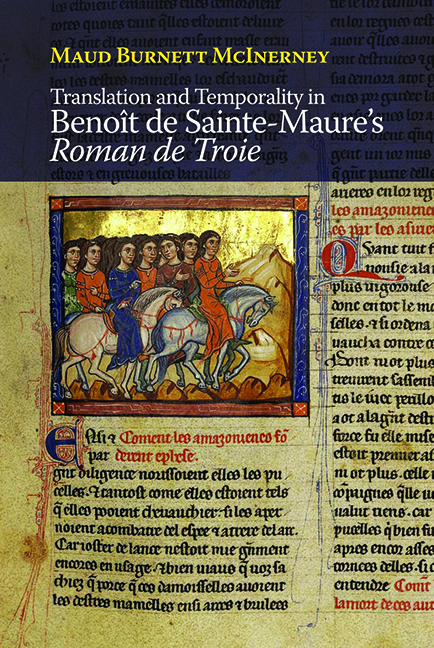Book contents
- Frontmatter
- Dedication
- Contents
- Acknowledgements
- List of Abbreviations
- Introduction: Trojan Time Machines
- 1 A Cupboard in Athens: Translating Troy
- 2 A Very Old Book, or How to Predict the Past
- 3 Ladies’ Time
- 4 Queer Time for Heroes
- 5 Hector in the Alabaster Chamber: Ekphrasis and its Discontents
- Conclusion: Trojan Futurities
- Appendix: The Manuscript Tradition of the Roman de Troie
- Bibliography
- Index
- Gallica
1 - A Cupboard in Athens: Translating Troy
Published online by Cambridge University Press: 07 October 2022
- Frontmatter
- Dedication
- Contents
- Acknowledgements
- List of Abbreviations
- Introduction: Trojan Time Machines
- 1 A Cupboard in Athens: Translating Troy
- 2 A Very Old Book, or How to Predict the Past
- 3 Ladies’ Time
- 4 Queer Time for Heroes
- 5 Hector in the Alabaster Chamber: Ekphrasis and its Discontents
- Conclusion: Trojan Futurities
- Appendix: The Manuscript Tradition of the Roman de Troie
- Bibliography
- Index
- Gallica
Summary
Sometimes history and romance, truth and fiction, seem more closely entangled than usual. Writing in December of 1792, after five months of extraordinary events from prison massacres to the abolition of the monarchy, Maximilien de Robespierre remarked, “our revolution has made me fully feel the force of the saying that history is a romance.” As I will argue in the pages that follow, the Anglo-Norman regnum in the mid-twelfth century forms another nodal point where the boundaries between history and fiction reveal themselves as particularly fluid. Benoît de Sainte-Maure's Roman de Troie, composed around 1165, both emerges from and participates in this fluidity, not least for the simple reason that it is a poem in octosyllabic rhyming couplets which declares itself to be a translation of a late antique prose text not even a tenth of its length. Translation as practiced by Benoît is a complex temporal phenomenon that reconfigures the past and produces specific effects upon the present and thus, potentially, upon the future. The use of translation to erode the borderline between history and fiction in the Roman de Troie reveals the essence of a peculiar kind of narrative temporality that would prove to animate the medieval imagination for centuries, a temporality we might call Trojan time.
Trojan time as it emerges in the twelfth century (there are other Trojan times, of course, notably the Homeric and the Virgilian) proves to be an erratic and brilliant manifestation of what Paul Ricoeur calls the “interweaving of history and fiction” according to which the two modes of narration use each other to refigure time itself. This refiguration is necessary because of the fundamental incompatibility between cosmological time – the movement of stars and planets, creating days and nights and years – and phenomenological time – lived, human time. The first volume of Time and Narrative begins with a reading of the eleventh book of Augustine's Confessions, in which the Bishop of Hippo confronts the impossibility of thinking about time: the past is always already past, the future is not yet, and by the time a thought can be articulated about the present, it has become the past.
- Type
- Chapter
- Information
- Publisher: Boydell & BrewerPrint publication year: 2021



